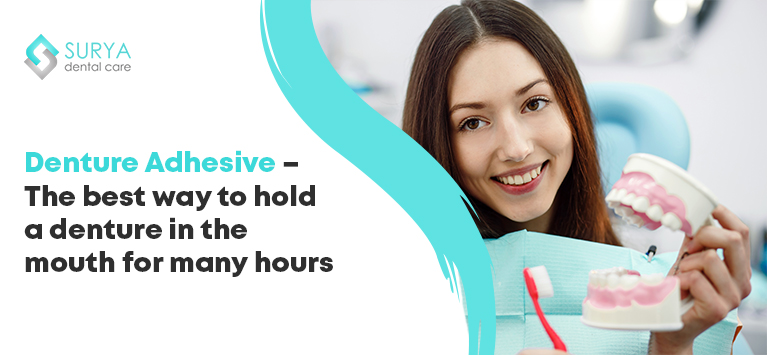
Denture adhesive (also known as denture glue) is a fixative substance prepared from water-soluble, non-toxic contents. If you are familiar with denture teeth, you might aware of this. When the adhesive is applied to the denture’s underside, it fortifies the light layer formed between the appliance and the gums.
The layer formed has high holding power so that it stabilizes the denture to the gums. Thus the adhesives ensure the denture teeth are well fitted and prevent slippage when you eat, speak, laugh, or sneeze.
When should you use a denture adhesive?
The denture teeth are not designed to be worn forever. You should get a new denture when the jawbone shrinks over time. Over time, the jawbone shrinks, and the supporting oral structures will change. It makes the prosthetic appliance no longer fit well in your mouth. Such ill-fitting dentures will cause various discomforts. The dentures tend to move inside your mouth and slip frequently.
In such circumstances, you should prefer an adhesive product to keep the teeth set to stay in its place. Meanwhile, there are some situations that affect the denture’s stability listed as follows:
- Taking cold medications will cause dry mouth. Such dryness in the mouth or shortage of saliva makes harder for the denture teeth to fit properly.
- If you get denture teeth immediately after teeth extraction, you should get denture adhesives. It is because the underlying bone takes at least 10 months to restructure following the teeth removal. This also makes the denture cannot stay in its place.
- If a denture wearer is suffering from neurological disabilities, they should get some extra support along with the normal physiological force to hold their dentures.
How does a denture adhesive work?
The denture adhesives establish a layer between the prosthesis and gums through saliva. Saliva can stick to both dentures and the gum tissues so that a film of saliva is developed to hold the teeth set. When you introduce an adhesive agent, the layer gets thickened and improves retention. It strengthened film of saliva exists until the prosthesis is pulled away.
What are the different types of denture adhesives available?
There are 3 types of denture glues. Regardless of the type of denture you are wearing, these adhesives take care of providing added security.
- Denture adhesive Powders – By sprinkling the right dose of adhesive powder on the denture, you can make it fit effectively for even 12 hours.
- Denture adhesive Creams – The denture creams are available in different formulations and flavors. Apply 3 to 4 drops of the cream in a pea-sized amount over the denture’s undersurface to get additional support.
- Denture adhesive Strips – Place the strip on the denture’s undersurface and then keep the appliance inside your mouth.
They do not irritate the soft tissues inside the mouth. However, consult your dentist before purchasing an adhesive for your denture teeth. It is mandatory to choose the right dose of the adhesive product suitable for your denture. Otherwise, they will cause irritations in your mouth.
Will denture glue cause problems?
You should apply the adhesive as per your dentist’s prescriptions. We have seen some patients develop soreness in their mouth after using denture glues, especially creams. When we examine their mouth and investigate how they exploit the substance, we found that those patients had used excessive amounts of adhesives.
Such people had believed that adding an overdose of adhesives would stabilize the teeth much more. It is a misconception.
Keep in mind that denture adhesives have a small amount of zinc oxide. Overuse of this compound has a toxic effect on your body. Due to this, we recommend zinc-free adhesives to some patients.
Bottom line
Using denture adhesive is the best way to keep your teeth set to stay in its place for a long time. The denture adhesives provide additional support to the prosthesis by strengthening the thin film of saliva between the gums and denture. While using denture glues, you should emulate what your dentist said else it tends to various discomforts. Don’t use adhesives if you have ill-fitting dentures. Buy new denture teeth instead.



